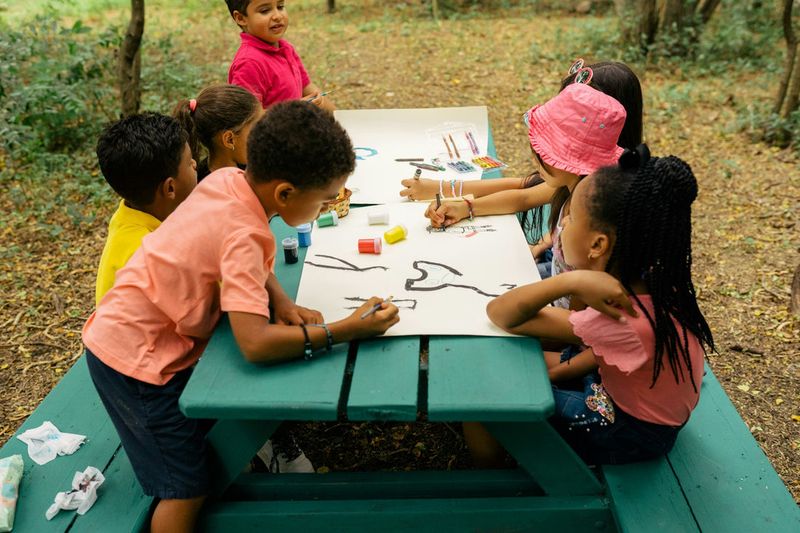Today’s fast-paced world often pushes parents to adopt modern parenting techniques, but some old-school methods have stood the test of time. These practices, rooted in tradition and wisdom, continue to resonate with families across the globe. By revisiting these classic approaches, parents can foster resilience, empathy, and a strong moral foundation in their children. Embracing timeless parenting strategies not only strengthens family connections but also nurtures well-rounded individuals. From the simple act of shared family dinners to the profound impact of modeling good behavior, these methods offer valuable insights for raising children in a balanced and nurturing environment.
1. Family Dinners

Gathering around the dinner table for family meals fosters open communication and strengthens familial bonds. Regular dinners are linked to improved mental health and better academic performance in children. This cherished tradition provides a platform for sharing daily experiences and nurturing relationships. Such interactions encourage children to express themselves freely, enhancing their social skills and emotional intelligence. Moreover, family meals serve as an ideal opportunity for parents to model healthy eating habits and discuss the benefits of balanced nutrition. Engaging in meaningful conversations during meals can also instill values of gratitude and empathy.
2. Assigning Household Chores

Assigning household chores to children is a time-honored method for teaching responsibility and teamwork. When kids contribute to daily tasks, they learn the value of hard work and develop a sense of accomplishment. This practice builds life skills that are essential for future independence and self-sufficiency. Completing chores together also strengthens family ties and promotes cooperation. Parents can use chore time to bond with their children, turning mundane tasks into engaging activities. This approach not only instills discipline and work ethic but also fosters pride in contributing to the family’s well-being.
3. Encouraging Outdoor Play

Nothing beats the joy of playing outdoors, where children can explore, discover, and let their imaginations run wild. Outdoor play enhances physical health, creativity, and social skills. Unstructured environments allow kids to engage with nature, promoting a sense of independence and adventure. Through games and teamwork, children develop problem-solving abilities and resilience. This timeless activity not only nurtures a love for the outdoors but also strengthens friendships and fosters community spirit. By encouraging outdoor play, parents can provide a healthy balance to indoor activities dominated by screens and technology.
4. Setting Clear Boundaries

Establishing clear boundaries is crucial for providing children with a sense of security and structure. Consistent rules help them understand expectations, fostering a stable environment where they can thrive. This practice encourages children to respect limits and recognize the consequences of their actions. When parents set and enforce boundaries, they teach valuable life lessons about accountability and self-discipline. Open dialogues about rules also promote trust and mutual respect. By setting boundaries, families create a framework for positive growth, where children feel supported and guided in their decision-making processes.
5. Teaching Respect for Elders

Teaching respect for elders is a cornerstone of traditional parenting, emphasizing the importance of recognizing and valuing wisdom and experience. This practice helps children understand social structures and fosters respect for authority figures. By instilling these values, parents prepare their children for future interactions and community involvement. Respect for elders also nurtures empathy and kindness, essential traits for personal growth. Engaging with older generations offers children unique insights and learning opportunities, enriching their understanding of the world. This timeless method strengthens family bonds and promotes a culture of respect and appreciation.
6. Encouraging Reading

The magic of reading transcends generations, continuing to captivate young minds and fuel curiosity. Encouraging reading enriches language development, critical thinking, and imagination. Through stories, children explore diverse worlds and perspectives, broadening their horizons. Reading together strengthens the parent-child bond, offering moments of shared discovery and joy. This timeless practice lays a foundation for lifelong learning and appreciation of literature. By fostering a love for books, parents nurture intellectual growth and emotional intelligence. The habit of reading opens doors to endless possibilities, inspiring creativity and a thirst for knowledge.
7. Limiting Screen Time

In a digital age, limiting screen time remains a vital parenting strategy to ensure children engage in diverse activities. Setting boundaries around device use encourages children to explore hobbies like reading, playing outside, or pursuing creative arts. This balance fosters a healthy, well-rounded lifestyle, steering them away from digital over-dependence. Parents can guide children in selecting appropriate content and timeframes, promoting conscientious consumption. Limiting screen time also enhances family interactions and promotes physical and mental well-being. By creating screen-free zones, families can reconnect and enjoy quality time together.
8. Allowing Natural Consequences

Allowing children to experience natural consequences is a powerful teaching tool, fostering responsibility and independence. When kids face the outcomes of their actions, they learn valuable problem-solving and decision-making skills. This approach encourages self-reflection and accountability, empowering children to make informed choices. By stepping back, parents give their children the space to grow and learn from real-life experiences. This method builds resilience, preparing them for challenges they may encounter in the future. Parents can guide with empathy and support, ensuring children feel safe while navigating the complexities of their decisions.
9. Practicing Gratitude

Practicing gratitude transforms daily life, fostering a positive mindset and strengthening relationships. Teaching children to express gratitude nurtures empathy and appreciation for others. This practice encourages mindfulness and reflection, helping kids recognize the value in everyday moments. By incorporating gratitude into family routines, parents model a constructive attitude towards life’s challenges. Gratitude can be expressed through simple gestures, like saying thank you or keeping a gratitude journal. These actions cultivate emotional well-being and resilience, enhancing overall happiness. Embracing gratitude enriches family dynamics, creating a supportive and harmonious home environment.
10. Modeling Good Behavior

Actions speak louder than words, especially when it comes to parenting. Modeling good behavior sets a powerful example for children, who often emulate their parents’ actions. Demonstrating kindness, responsibility, and resilience equips children with essential life skills. This approach encourages positive behavior patterns, shaping character and values. Parents can inspire their children by sharing acts of generosity or showing respect to others. Leading by example instills integrity and empathy, guiding children in their personal growth. By embodying the qualities they wish to see, parents lay the foundation for a compassionate and principled future generation.
11. Encouraging Creativity

Nurturing creativity in children unlocks a world of imagination and innovation. Encouraging creative expression through art, music, or storytelling helps develop problem-solving skills and cognitive abilities. This practice fosters individuality and self-confidence, allowing children to explore their unique talents. Creative activities provide an outlet for emotions and ideas, promoting mental well-being and resilience. Parents can support their child’s creative journey by providing resources and celebrating their artistic achievements. By prioritizing creativity, families cultivate a culture of curiosity and exploration, inspiring children to think outside the box and embrace new possibilities.
12. Fostering Independence

Fostering independence equips children with the skills needed to navigate life’s challenges confidently. Encouraging decision-making and problem-solving helps build self-reliance and resilience. Parents can gradually give children more responsibilities, allowing them to learn from experience. This approach empowers children to trust their instincts and take initiative. By supporting their child’s independence, parents nurture a sense of autonomy and competence. It’s essential to maintain a balance between guidance and freedom, ensuring children feel supported while exploring their capabilities. Fostering independence lays the groundwork for a successful transition into adulthood.
13. Celebrating Cultural Traditions

Celebrating cultural traditions deepens family connections and enriches children’s understanding of their heritage. Participating in cultural events fosters pride and identity, grounding children in their roots. This practice offers opportunities for storytelling and sharing family history, strengthening intergenerational bonds. Embracing cultural traditions encourages children to appreciate diversity and respect different perspectives. Parents can involve children in preparations, enhancing their sense of belonging and participation. By keeping traditions alive, families pass down values and wisdom, ensuring a legacy for future generations. Celebrating culture creates a nurturing environment where children thrive and flourish.

Well, hello there!
My name is Jennifer. Besides being an orthodontist, I am a mother to 3 playful boys. In this motherhood journey, I can say I will never know everything. That’s why I always strive to read a lot, and that’s why I started writing about all the smithereens I came across so that you can have everything in one place! Enjoy and stay positive; you’ve got this!

